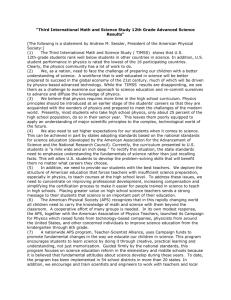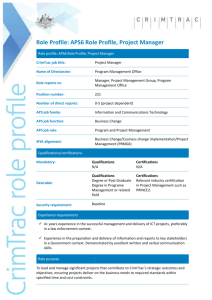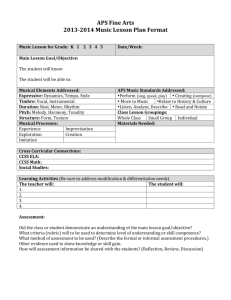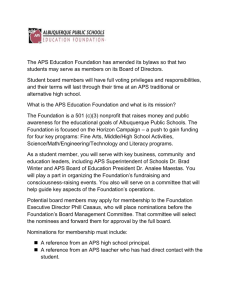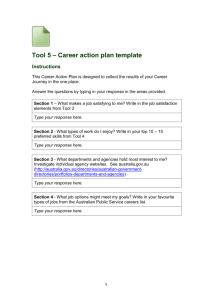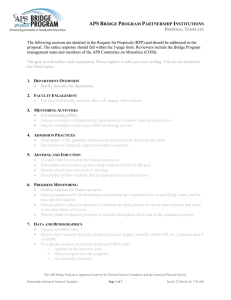Increasing Efficiency in Adult Protective Services
advertisement
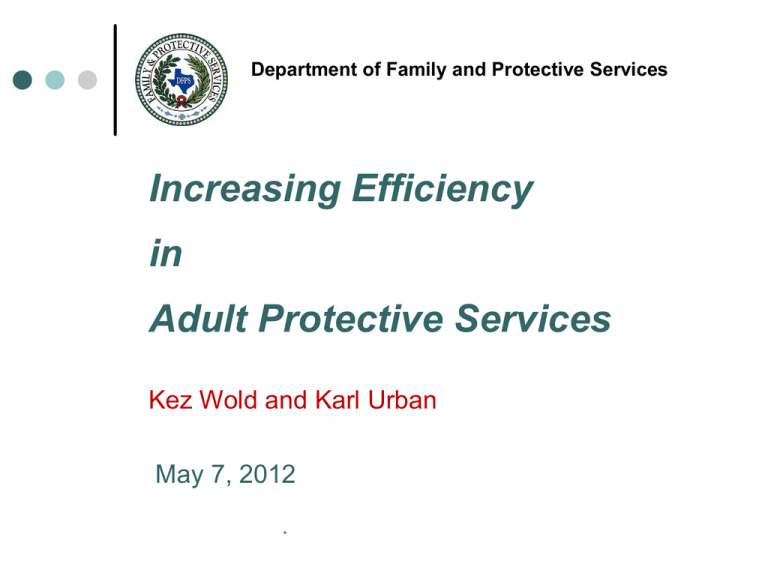
Department of Family and Protective Services Increasing Efficiency in Adult Protective Services Kez Wold and Karl Urban May 7, 2012 * PRESENTATION OBJECTIVE The Texas Adult Protective Services (APS) program is having to do more with less. Increasing intakes combined with decreasing staff necessitates taking a hard look at who we serve and how we serve them. •This presentation will describe some of the changes being contemplated by APS. •To have a dialogue with the Aging Network about these changes. * OVERVIEW OF PRESENTATION •Brief overview of APS •Current trends in APS •Upcoming potential changes in APS •Changes to definitions of who we serve •Changes to how we conduct casework •Questions and Answers * MISSION The mission of Adult Protective Services (APS) is to protect the older adults and people with disabilities from abuse, neglect, and exploitation. * APS PROGRAMS APS Program has two primary components: •In-Home Delivery •Facility Investigations and Service Investigations * STATUTORY AUTHORITY Chapter 48 of the Texas Human Resources Code authorizes APS to investigate reports of abuse, neglect, and exploitation of: •elderly persons (age 65 and older); •adults with disabilities; and •persons receiving mental health and/or mental retardation services in a state school, state hospital, community center, state center, licensed intermediate care facility for the mentally retarded (ICF/MR), or via Home and Community-based Services (HCS) and Texas * Home Living Medicaid waiver programs. IN-HOME INVESTIGATIONS AND SERVICES •In-Home investigations are conducted in private residences, room and board homes not subject to licensure, and/or adult foster care homes with three or fewer residents. •APS may arrange for or provide the following services: •emergency financial assistance for rent and utility restoration •social services •emergency shelter •health services •referral to or collaborate with other community services, including guardianship * * * CURRENT APS IN-HOME TRENDS •The client base and intakes are rapidly rising •The 82nd Texas Legislature reduced the number of caseworkers •APS has implemented casework practice changes that have improved efficiency and reduced caseloads •Mobile caseworkers •“As You Go” documentation using tablet-PCs •Caseloads are projected to significantly increase over the coming years * * * * KEY CHALLENGES • •Increasing intakes, decreasing staff •Defensive casework practice – “fear of the one bad case” •A changing, increasingly mobile workforce •Casework practice that is uniform for all types of allegations •Limited ability to address needs of some clients (especially mentally ill, chronically poor) leading to less than optimal outcomes and frustrated (at best) or burnedout staff * BACKGROUND ON CHANGING WHO WE SERVE (82nd R) granted HHSC the authority to define In-Home ANE in APS investigations by rule in the Texas Administrative Code. •SB221 •Changes to definitions will allow APS to: •Focus on providing the most effective protection possible •Make distinctions in the definitions between paid and unpaid caretakers * RULE PROMULGATION TIMELINE 14, 2012 – Internal agency deadline for rule packet preparation •February •April 20, 2012 – Presentation to DFPS Council •May 18 to June 18, 2012 - Public comment period 20, 2012 – DFPS Council meeting for adoption if significant comments •July •September 1, 2012 – Effective date * POTENTIAL TYPES OF CHANGE •Eliminate cases when the APS investigation will not alleviate the root cause •Eliminate duplication of cases in which other entities have clearer responsibility and resources •Streamline cases in which an expedited investigation would be more efficient * IMPLEMENTATION OF CHANGE •Rule •Two types of changes definitions of target populations and definitions of ANE •For APS to investigate, must be in target population and then must meet definition of ANE •Program policy •Statewide Intake Guidelines •Staff training and culture change * SUICIDAL THREAT •TAC says APS conducts investigations of “[A]n elderly person or an adult with a disability … at risk of self neglect or suicidal threat.” [40 TAC 705.001(7) and (17)] •Remove this as an APS responsibility in cases with no other ANE because APS is not a first responder •Statewide Intake will continue to refer to law enforcement or MH&ID crisis teams * DEFINITION OF PERSON WITH A DISABILITY •A person with a mental, physical, or developmental disability that substantially impairs the person’s ability to provide adequately for the person’s care or protection.” •Proposed change is to define “substantial impairment” in rule: •“grossly and chronically diminishes an adult’s physical or mental ability to live independently or provide self-care” •Current APS policy defines "substantially impairs" as "requires assistance" with one or more ADL or qualifies for SSDI/SSI – Put in place a better way of determining disability. * PAID CARETAKER CHANGES •Currently, APS rules make no distinctions between paid and nonpaid caregivers. Paid caretakers have a different responsibility and relationship in the following areas: •Exploitation •Neglect •Emotional and Verbal Abuse * New Definition of Caretaker Unpaid •A guardian, representative payee, or other person who by act, words, or course of conduct has acted so as to cause a reasonable person to conclude that he has accepted the responsibility for protection, food, shelter, or care for an alleged victim. This excludes paid caretakers as defined by this chapter. * Paid •An employee of a home and community support services agency licensed under Chapter 142, Health and Safety Code, •An individual privately-hired and receiving monetary compensation to provide personal care services… FOCUS ON PHYSICAL INJURY AND EMOTIONAL HARM IN ANE •Physical Injury: Physical pain, harm, illness, or any impairment of physical condition. •Emotional harm: Observable signs of distress, such as anguish, grief, fright, humiliation, or fury. * Definition of Abuse Current Proposed •The negligent or willful •Any knowing, reckless, infliction of or intentional act or failure to act, including •Injury, •unreasonable •unreasonable confinement, confinement, •corporal punishment, •intimidation, or •inappropriate or •cruel punishment excessive force, or •intimidation, •with resulting physical or •which caused [or may emotional harm or pain. have caused*] physical injury, death, or emotional harm. * * included for paid caretakers Definition of Neglect Current •The failure to provide for one’s self the goods or services, including medical services, that are necessary to avoid physical or emotional harm or pain or the failure of a caretaker to provide such goods or services. * Proposed •Both: the failure to provide the protection, food, shelter, or care necessary to avoid emotional harm or physical injury •Plus, for Paid: a negligent act or omission that caused or may have caused emotional harm, physical injury, or death NEGLECT AND EMOTIONAL AND VERBAL ABUSE •Current definitions do not recognize that paid employees have a higher standard of care •APS wants to make the definitions more precise to the nature of the caretaker role •For example, yelling and vilifying among family is different than by a paid caregiver * Definition of Emotional or Verbal Abuse Current •Any use of verbal communication or other behavior to humiliate, intimidate, vilify, degrade, or threaten with harm. * Proposed •Paid •act or communication that is (1) used to curse, vilify, humiliate, degrade, or threaten and that results in physical injury or emotional harm; or (2) of such a serious nature that a reasonable person would consider it emotionally harmful •Unpaid •any act or use of verbal or other communication to threaten violence •causes person to fear imminent physical injury DEFINITION OF EXPLOITATION •“The illegal or improper act or process of a caretaker, family member, or other individual who has an ongoing relationship with an elderly or disabled person that involves using, or attempting to use, the resources of the elderly or disabled person, including the person's social security number or other identifying information, for monetary or personal benefit, profit, or gain without the informed consent of the elderly or disabled person.” [HRC 48.002(a)(3); 40 TAC 705.1001(21)] •APS is no longer investigating theft except for paid caregivers •If client appears to have capacity and indicates they don't want to address the issue, then: •Have a process to assess if the client is in need of assistance from APS or wants to make changes •Where no ongoing protection is needed, streamline the investigation to limit the amount of documentation and time spent on investigation •Continue to make appropriate referrals * New “Financial” Exploitation Definitions Unpaid Paid •the illegal or improper act or process of an alleged perpetrator using, or attempting to use, the resources of the person, including the person’s social security number or other identifying information, for monetary or personal benefit, profit, or gain… •without the informed consent of the alleged victim. •Financial exploitation excludes theft of property. •There is no informed consent when it is: (1) not voluntary; (2) induced by deception or coercion; or (3) given by an alleged victim who the actor knows or should have known to be unable to make informed and rational decisions because of diminished capacity or mental disease or defect. * •the illegal or improper act or process of an alleged perpetrator using, or attempting to use, the resources of the person, including the person's Social Security number or other identifying information, for monetary or personal benefit, profit or gain. •This includes, but is not limited to, offenses against property found in Texas Penal Code Chapters 31 and 32. Definition of Sexual Abuse •Current Practice •Consensual sexual relationship is not abuse •Non-consensual sexual conduct is abuse as defined by penal code * •Proposed Changes •Nonconsensual relationships and those in which an individual does not have capacity to enter into the relationship. Definitions of Sexual Abuse Current •involuntary or nonconsensual sexual conduct with a person age 65 or older or person with a disability that constitutes an offense under Section 21.08,involuntary or nonconsensual sexual conduct with a person age 65 or older or person with a disability that constitutes an offense under Section * 21.08, Penal Code Proposed •nonconsensual sexual activity, which may include, but is not limited to, any activity that would be a sexually-oriented offense per Texas Penal Code, Chapters 21, 22, or 43. PROPOSED DEFINITION SEXUAL ABUSE, CON’T. •b) There is no consent when: (1) alleged victim is incapable of consenting because of impairment in judgment due to mental or emotional disease or defect; (2) consent is induced by force or threat against any person; (3) the alleged victim is unconscious or physically unable to resist; (4) the alleged perpetrator has intentionally impaired the alleged victim by administering any substance without the person’s knowledge; or (5) consent is coerced due to fear of retribution or hardship, or by exploiting the emotional dependency of alleged victim on the alleged perpetrator. * CHANGING CASEWORK PRACTICE •APS treats all cases the same regardless of the allegation type or the potential “risk” to the client •Moving forward, APS is considering: •Does there need to be “differential response” between self neglect and perpetrator-driven cases •Are there tools to help determine risk, which would indicate a different type of response •If the answer is yes, how do we make the changes * * * NEXT STEPS •APS is preparing a procurement to determine what types of risk assessment tools are available and what it would take to adapt APS policy and information systems to use them •Targeted implementation is FY 2014. * QUESTIONS AND ANSWERS *
